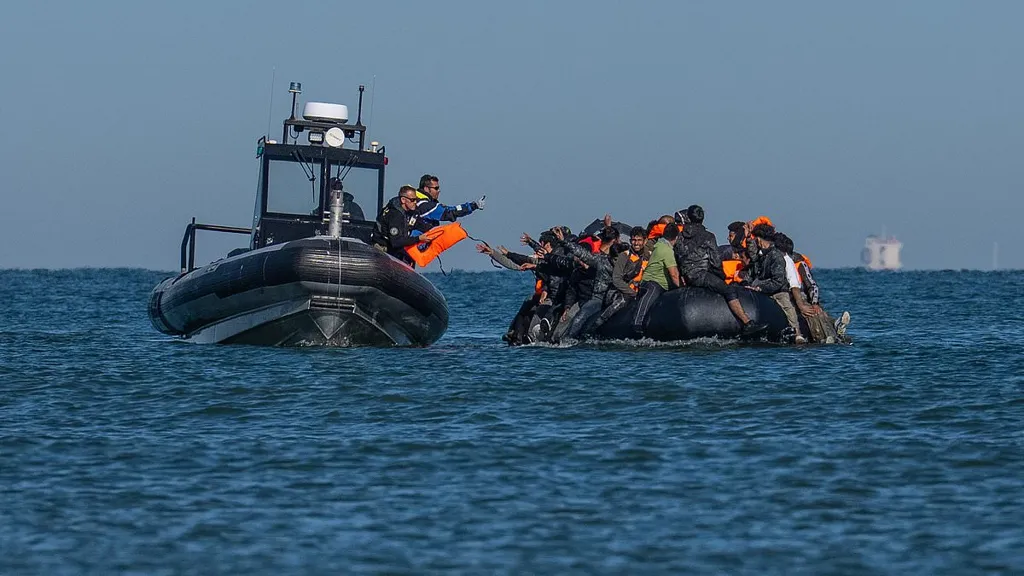Another senior Labour figure has said Britain should 'decouple' from the European Convention of Human Rights (ECHR) to tackle the Channel migrant crisis.
Jack Straw, who was Labour home secretary between 1997 and 2001, warned the ECHR was being 'misused' in some legal cases to prevent migrant deportations.
'There is no doubt at all that the convention - and crucially its interpretation - is now being used in ways which were never, ever intended when the instrument was drafted in the late 40s and early 50s,' he told the Financial Times.
Mr Straw helped draft the UK's 1998 Human Rights Act, which enshrines the ECHR in UK law, as part of Sir Tony Blair's New Labour government.
But he said the 'use or misuse' of the convention was 'never anticipated when we were discussing in great detail how we incorporated human rights into British law in the mid-90s'.
The instruction for UK courts to 'take account' of ECHR judgments has 'been interpreted as 'follow', when that was never the intention', Mr Straw added.
He is the second former Labour home secretary to call for a rethink of the application of the ECHR in Britain's legal system, as pressure piles on Sir Keir Starmer to act.
Lord Blunkett, who succeeded Mr Straw in the Home Office, has suggested Britain should temporarily suspend its membership of the ECHR in order to tackle the small boats crisis.
Jack Straw, who was Labour home secretary between 1997 and 2001, warned the ECHR was being 'misused' in some legal cases to prevent migrant deportations.
Mr Straw's comments will increase the pressure on Sir Keir Starmer to take more radical action in order to get a grip on the small boats crisis.
Mr Straw told the newspaper that the Human Rights Act could be amended to state that British courts do not have to take account of the ECHR.
This would be preferable to triggering a complete withdrawal from the ECHR, which would take many years to accomplish, he added.
Mr Straw's comments will increase the pressure on the Prime Minister to take more radical action in order to get a grip on the small boats crisis.
A record 28,947 people have crossed the Channel in small boats this year, after 659 migrants did so on Monday in nine boats.
Sir Keir, a former human rights lawyer, is opposed to quitting the ECHR and believes it would place Britain in the 'same camp' as countries such as Russia and Belarus.
But he is facing growing demands from both within his own party and among his political rivals to alter his stance.
Reform UK leader Nigel Farage yesterday unveiled his party's plans to deport 600,000 asylum seekers within five years if he becomes prime minister.
This would include Britain quitting the ECHR and scrapping the Human Rights Act in favour of a British Bill of Rights, Mr Farage said.
He insisted the Good Friday Agreement in Northern Ireland could be 'renegotiated' to remove references to the ECHR.
Tory leader Kemi Badenoch is also expected to back leaving the ECHR at the Conservative Party conference in October.
Graham Stringer last week became the first Labour MP to call for Britain to withdraw from the ECHR in a bid to stop small boat crossings.
Home Secretary Yvette Cooper is conducting a review over the use of Article 8 of the ECHR - the right to private and family life - in migration cases in Britain.
Several deportation attempts have been halted by how the ECHR clause has been interpreted in UK law.
But Downing Street yesterday said Sir Keir remains opposed to ending the UK's membership of the ECHR, with No10 pointing to the potential impact on Northern Ireland.
The PM's official spokesman said: 'The ECHR underpins key international agreements, trade, security and migration and the Good Friday Agreement.
'Anyone who is proposing to renegotiate the Good Friday Agreement is not serious.'
Hilary Benn, the Northern Ireland Secretary, said Mr Farage 'hasn't the faintest idea of the consequences' of removing the ECHR from the Good Friday Agreement.
He insisted that the ECHR is 'one of the pillars' of the 1998 agreement that ended most Troubles-related violence.
'The 1998 Good Friday Agreement brought to an end three decades of terrorist violence in Northern Ireland and across the UK,' Mr Benn said.
'For Nigel Farage to talk flippantly about trying to remove one of the pillars of that historic agreement shows that he hasn't got the faintest idea about the consequences.
'To jeopardise the Good Friday Agreement would not only be dangerously irresponsible, but would also disrespect all those who helped to bring about the peace that the people of Northern Ireland now enjoy.'
